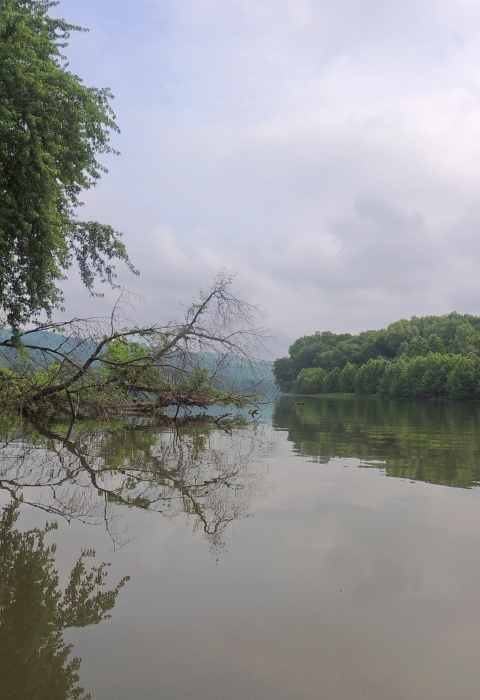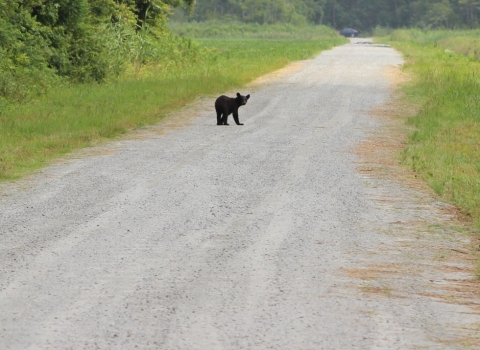George Wetzel, with Kerr’s dead dog (“a noble large animal”), was buried on Williamson Island, Spring 1784. Wetzel had been killed during an ambush by Indians at the mouth of the Muskingum, site of present day Marietta.
The story was recounted by Samuel Hildreth in his excellent “Memoirs of Early Pioneer Settlers of Ohio”:
In the spring of the year 1784, before Fort Harmer was built, or any settlements made by the whites, between Baker’s station [this is near present day Proctor, WV, about ten miles upriver from Williamson Island] and the mouth of the Big Kenawha, a party of young men left the post in a large canoe on a trapping and hunting expedition. It was composed of Lewis and George Wetzel, John Greene, Hamilton Kerr, and one other man. They dropped down the river as low as [Buckley Island], where they encamped. The next day at evening they went over to the mouth of the Muskingum, and set their traps for beaver, returning to the island as a safe place for their camp against the attack of the Indians.
The following morning they went down again, and thirty or forty rods [a rod is just over 16 feet] above the mouth, landed two of their party [John Greene and George Wetzel] to reconnoiter and examine the woods for signs of the enemy, while the other three remained in the canoe, and went to the Muskingum to examine their traps. They directly discovered that several of their traps were missing, and immediately concluded that a party of Indians had discovered their marks and stolen them. George Wetzel soon returned to the canoe and reported that he had seen no Indians, but plenty of signs of bears, which had been wallowing and tearing down the weeds in several places. This confirmed their suspicions that they were in the vicinity of a large party of Indians.
Taking George on board, they pushed up the Ohio, and had proceeded twenty or thirty rods on their return [about 450 feet upriver, or about the location of the present day Lafayette Hotel and Front Street fountain], when four Indians stepped on to the bank, and from behind trees fired upon the men in the canoe. George Wetzel was shot through the head, and fell dead into the boat. Kerr was shot in the left arm above the elbow, splintering the bone, and received a bullet at the same time through the fleshy portion of his side. His dog, a noble, large animal standing by his master, was also killed. The other two men escaped injury; and pushing out into the stream before [the Indians] could reload, were soon out of danger.
John Greene, who rambled farther into the woods than George, had returned to within a few rods of the bank when the Indians fired, and hearing the report of their rifles he rushed up to see what his comrades had shot at. As he approached within twenty yards of the bank, he saw an Indian behind a tree in the act of pushing down a bullet in his rifle. Comprehending at once the condition of the parties, he instantly raised his piece, fired, and the Indian fell dead, tumbling headlong down the bank near the brink of which he was standing, and rolled close to the water’s edge.
The other Indians, hearing the report of the shot and seeing their dead companion, came rushing upon their new enemy before he could reload. His only safety was now in flight; and running toward the swamp a short distance back from the river, in the windings and turning of the pursuit, counted not less than ten or twelve Indians, whom the shots and the war-cry of savages had called into the chase.
After wading in the water for some time, and seeing no chance for escape by flight, he secreted himself under the tops of a fallen tree, whose leaves and branches sheltered him from observation. As a further precaution, he buried himself beneath the water, leaving only so much of his face uncovered as allowed for respiration. This was a common mode of eluding pursuit, practiced by the natives, as well as cunning white men. The Indians, a few rods behind, traced him by the turbid appearance of the water, and walked directly on to the trunk, beneath whose top he lay concealed. Looking up through his leafy covert, he plainly saw his enemies, peering into every crevice, and behind every twig for their victim, vociferating in angry tones their vengeful thoughts, and pointing with their gun-sticks to the recent signs of his flight. Greene lay perfectly quiet, hardly daring to breathe, fearing lest even the beating of his heart would agitate the water; watching with intense anxiety their movements until finally, to his great relief, they gave up the search as hopeless.
As soon as the darkness of night concealed his movements, he left his watery bed, wet, weary, and hungry. Having a long journey before him, he instantly commenced his march for home, thankful that he had been able to escape the scalping-knife of his foes. He traveled across the ridges, the nearest route, well known to the hunters of that day. In the course of his journey he passed no less than three deserted Indian hunting camps, so recently left that the fire was still burning, without being discovered. So rapid was his march that he reached Baker’s before his companions in the canoe, who had pushed up stream as rapidly as they could and buried the dead man on the island twenty-five miles above Marietta now known as Williamson’s. This mournful work detained them some time, as they had no spades but their wooden paddles with which to dig the grave. The favorite dog of Kerr, whose dead body had made a pillow for the head of his wounded master, was buried at the same place.
Island Access: Paden City, WV, public access ramp at Paden City Park off SR 2


